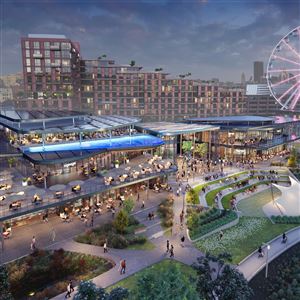A group of union workers Monday expressed support for the Esplanade project, a move that was met with opposition from several Manchester residents who for months have been calling for community meetings and more information about the proposal.
Mixed reactions to the $600 million plan to turn a North Side industrial site into a riverfront destination came during Monday’s Pittsburgh Public Schools monthly public hearing. The meeting was held days before the board is set to vote on a Manchester-Chateau Transit Revitalization Investment District, or TRID.
“For us and my organization, this is about jobs,” said Steven Mazza of the Eastern Atlantic States Regional Council of Carpenters. “It’s about training, it’s about things that we’re trying to accomplish in our neighborhoods, our communities, all over the city.”
Union jobs, Mr. Mazza said, are about “breaking the chains of poverty.”
But others, while supporting the unions, pushed back against those statements and instead expressed concerns over possible negative impacts the project could have on Manchester, a majority Black neighborhood.
“One of the misconceptions that people have about Manchester Neighbors is that we want to stop this process from happening,” Manchester resident Terrance Turk said. “You’ll hear a lot of people here from unions and everything like that promising jobs and stuff like that. Where were you guys the last 50 years that I’ve been down Manchester? Where they been? Now all of a sudden they want to come.”
The Esplanade project — a 15-acre redevelopment along the Ohio River that would be anchored by a giant Ferris wheel — has been a point of contention for many in the Manchester community who since December have shown up to public hearings calling to meet with developers and to be presented with more information about possible project impacts.
Residents formed the group Manchester Neighbors in an effort to provide data and information to the neighborhood regarding the proposal.
The Esplanade project, the master plan for which was approved in November by the Pittsburgh Planning Commission, would redevelop a former North Side industrial site located just west of the West End Bridge and would feature the Ferris wheel, a 408-unit apartment tower up to 19 stories high with as many as 308 parking spots, retail space and a food emporium.
The first phase of the plan would include the apartment tower, Ferris wheel and a three-story, 64,256-square-foot space featuring a food emporium, a four-seasons garden and restaurants. It would be connected to an outdoor amphitheater. Developers are also proposing a marina, 17 homes similar to houseboats that would be built on barge-like bases, retail and a 651-space parking garage.
Second-phase projects could include an office or residential addition that could be built above the garage, a “destination aquarium” and two more residential projects.
Among the apartments, the developer promised to designate 20% of the units as affordable to households at 80% of the area median income.
The decision to approve the project’s master plan came after Manchester community groups and a number of residents threw their support behind the project, saying it could be a catalyst for the neighborhood and efforts to increase affordable housing.
School directors are now contemplating the TRID, which would help pay for nearly $54 million in infrastructure and other improvements associated with the project. The TRID needs backing of the district, the city of Pittsburgh and Allegheny County.
But many are trying to get the board to take a step back before voting on the plan.
“Really asking for you guys just to table the vote so that we are given the opportunity to speak with the developers so that we get a little bit more information on how it’s affecting us,” Manchester resident Taylor Woodruff said.
Ms. Woodruff, a third-generation Manchester resident, doesn’t want to lose her neighborhood.
“We know exactly how this looks,” Ms. Woodruff said. “We’ve seen it happen in East Liberty and we know how it looks. Eventually, you walk around you see less and less of people of color and it starts to feel like we don’t have a place of belonging.”
The thoughts echoed those of Carol Green who added: “I definitely don’t want to leave Manchester. That’s my home.”
On Monday, a petition with hundreds of signatures was presented to school directors, resident Roberta Bowra said. She pushed for developers and union leaders to meet with Manchester residents, something Mr. Turk also called for.
“We love unions,” Mr. Turk said. “Most of my family’s in unions. We have no problem with unions. We have no problem with this actual TRID happening. But we just want to have a plan for Manchester to show what the impact is going to be for Manchester and what the benefit is going to be for Manchester.”
But several union leaders, along with a few others who threw support behind the project, pointed to jobs that would be created during and after the development.
“The economic activity that’s spurred through developments like this have generational impacts. … This is an opportunity for employment not only on the jobs, not only on this particular project, but for many projects to come,” Jason Markovich of the Pittsburgh Regional Building Trades Council said. “It can change the lives of the people of Manchester and the city of Pittsburgh.”
Manchester resident Sabreena Woods-Miller said she realized there’s a “strong feeling of disconnection” physically and economically in the neighborhood. The TRID, she said, “presents a significant opportunity to address these challenges if done correctly.”
School directors will vote on the TRID at Wednesday’s legislative meeting.
First Published: April 28, 2025, 8:54 p.m.
Updated: April 29, 2025, 3:15 p.m.

